Featured
Obasanjo advocates policy continuity in governance
Published
3 years agoon
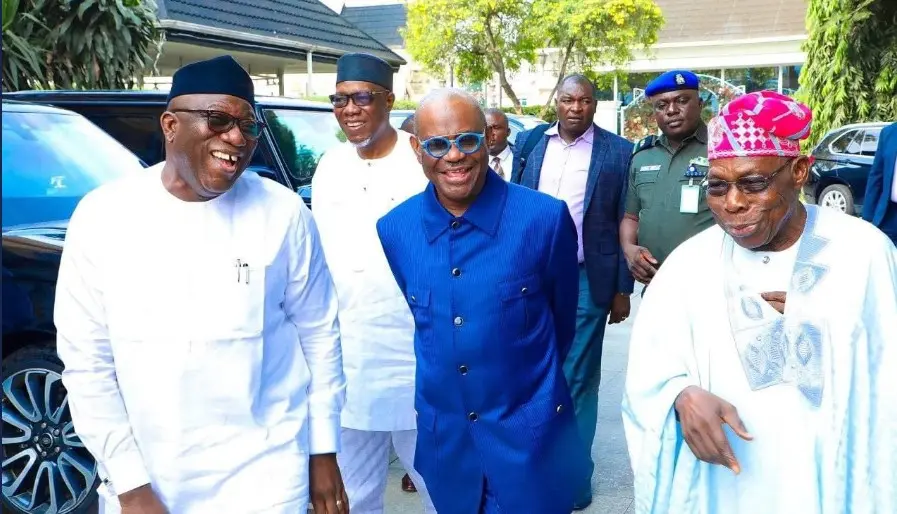
Former President Olusegun Obasanjo, delivering a key note address at the international conference on “Deepening Democratic Culture And Institutions
For Sustainable Development And Security In Nigeria” at the
Dr. Obi Wali Convention Centre, Port Harcourt, Rivers State, on Thursday, advocated the essence of policy continuity in democratic government by successors.
At the conference with theme: “Respecting the principles of democracy”, former President Obasanjo stated: “when we learn to play by the rules and respect the principles of democracy, we recognize that ascension to office does not empower incumbents to destroy all policies and programmes initiated by the predecessor. Rather, a new leader is expected to contribute to a high level of continuity of policies.”
He maintained that the stability that a free and fair election process brings should encourage elected officials to take off quickly and produce results.
According to the former President, “in this case, it really does not matter the party your predecessor belonged to. The policies and projects are in the interest of the people. Party is only a platform to achieve the best for the people by those who have got the mandate of the people.”
He pointed out that our failure on several, if not all fronts, is because we are impatient with democracy and democratic practice. That impatience takes an element of greed, selfishness and lack of patriotism with it, he explained. He stated: “yet, if you look at our pre-colonial history, you will find countless strong practices that were genuinely democratic, including checks and balances, to prevent dictatorship and bad governance in whatever form. “When a new King/Queen is installed, he/she does not proceed to behave as if the community is new. He/she does not immediately proceed to build a new palace and destroy the legacies of the predecessor. Rather, the focus is to correct past errors, build on inherited legacies, cultivate support from all quarters, enhance inclusion and respect existing governance and leadership structures and institutions.”
The former President decried that in Nigeria, each new government behaves as if Nigeria is a newly found country.
“In fact, during campaigns, some leaders sound as if they plan to reinvent Nigeria and create new Nigerians overnight. That is because they miss the aspect of democracy that emphasizes continuity, stability and predictability. One regime can lay the foundation but it requires many regimes to continue to build positively and constructively on the foundation.
“It is largely because we overlook and often disregard the basic principles of democracy. And somehow, we do not appreciate the damage that we do, individually and collectively, to the fabric of the nation. The sort of anger and bitterness we express while talking about fellow Nigerians, our willingness to throw out the baby and the bath water, the high level of intolerance and preparedness to unleash violence on opponents give cause for concern. I marvel at the level of arrogance of incompetence and ignorance. The impunity is sickening.
“I believe that we urgently need to get back to the basics and rebuild our commitment to democratic practice. We must take some time for introspection and ask if we have been doing the right things to ourselves and to future generations. And in reality, it is not rocket science to get back on the path of democracy and social justice. It begins with self-commitment, then leadership commitment. There are thousands of persons with integrity all over the country. Leaders need to identify and connect these persons with their communities and organisations to build a true national movement and commitment to democratic practice. Once we commit to opening up democratic spaces, sanctioning breaches and emphasizing transparency and accountability at all levels, Nigeria will begin the cultivation of a new democratic culture that will spread to all nooks and corners of the nation. I do not by any means assume that this would be easy. We have made many false starts in the past. We have steadily become impatient with democracy, its principles and practice as we demand instant results. But past failure should not discourage us from embracing new vistas or perspectives that will guarantee our survival.
“Without reinventing the wheel therefore, let me state very clearly that the principles I have been talking about include, but certainly not limited to building and compacting a truly people-led and people-driven Constitution that they would own and defend against political predators of any form. This is the basic foundation that when you involve the people in the process, they understand it, make their inputs, see the document as their own; not only would they defend it, but it would also guide their political actions, alignments and realignments.
“Their welfare and well-being is involved and they can make meaningful contributions.
The extent to which we buy into the popular compacting of a democratic Constitution and use the process to strengthen the independence of the judiciary and the electoral umpire, encourage the popular teaching of the Constitution to promote a culture of constitutionalism, promote and guarantee basic rights, the easier it would be for Nigeria to engage the challenges that negate national cohesion, growth and development,” Obasanjo highlighted.
He said that money cannot buy patriotism but it can build institutions, interactions and promote the brand of development that commits the people to the nation and its leadership.
The full statement reads:
“RESPECTING THE PRINCIPLES OF DEMOCRACY”
Keynote Address
By
Chief Olusegun Obasanjo
At The International Conference On “Deepening Democratic Culture And Institutions
For Sustainable Development And Security In Nigeria”
Dr. Obi Wali Convention Centre, Port Harcourt, Rivers State, January 26, 2023
PROTOCOLS
I am delighted to be here today for what I believe would be an exciting Conference. I thank the organisers for inviting me to deliver this Keynote Address at this critical time in our nation’s political history. It has been a while since academics, politicians, policymakers and professionals from all over the world came together to discuss NIGERIA.
Let me specially commend the Governor of Rivers State, Governor Nyesom Wike, for putting his weight behind this intellectual excursion and for his hospitality. We sure need more opportunities to interrogate and understand our past and present, to design and plan our future. As you all know, a nation that does not engage in conversations, self-analysis, self-criticism, and regular reading and interaction cannot make meaningful and sustainable progress.
It is probably best to state right from the beginning that no two democracies are exactly alike. Democratic practice and institutions are shaped by the specificity of history, socio-political struggles, culture, nature of production and exchange, orientation, social balances and the character of the government and ruling elites. However, citizens that live in democracies share common perspectives, expectations and commitments to the basic tenets of democratic practice. And they may turn out to be beneficiaries or victims depending on the course of the process and practice of democracy.
Of course, the world is increasingly complex, information and technology-driven, and governance is now almost completely open. It is true that a governing and ruling elite that is not firmly anchored in production will not have the urge to invest in research and development, science and technology, and good governance. And such an elite will not have much interest in dominating the local market and penetrating foreign markets to promote accumulation for development and growth. An elite of commission agents, politicians, appointment hunters and influence peddlers is unlikely to appreciate the value of democracy and democratization. Therefore, in this our brief conversation today, my goal is to redirect our minds to where we missed the bus. If we are patient, humble, reflective, and willing, another bus is just around the corner: are we ready to be active passengers?
Our democracy has gone through twists, dives and turns since political independence and we are all living witnesses to our achievements and failures. The best of our history has been the sustenance of democracy since the transfer of power to an elected government in 1999. There is reason to appreciate this part of our history because we have thus far kept the military out of the full and formal control and domination of political power. However, there may be reasons to doubt how much lessons the leaders and followers have drawn from our past and how far they are willing to go to deepen, widen and strengthen democracy and democratic practice.
In addition, it is not enough to keep recycling activities and debates around liberal democracy, but we must, as a people, be prepared to move from democracy to democratization. That is, a political and social process that is defined, driven, absorbed, and monitored by the people in their various communities and constituencies in the larger interests of the nation. It is such a process that gives us the confidence that we are building a credible and sustainable foundation for the future and for everyone.
Everyone in this room, whether we admit it or not, is an expert in Nigerian politics. We all have opinions and we have prescriptions for all the problems of Nigeria. Yet, the country is not making progress. Most of us are experts in what we know little or nothing about and ignoramus in what is our duty and responsibility. We have tried all sorts of regimes, ideologies, planning strategies and personalities in power: the so-called new breed did not show that they were different. Equally, states run by professors, retired military officers and other professionals including teachers did not experience visible and substantial improvements. True, there have been some outstanding leaders at various levels of power but no tree has ever made a forest; the good ones are few and far in between and did not form critical mass. The lack of conversations across fault-lines and primordial proclivities mean that our leaders are unable to share ideas and have durable and sustained policies for long enough time. This prevents useful cooperation, collaboration, stability and sustainability. It means that whatever best practices are in one location remain there and may die there. If after six decades of political independence, our leaders are not showing clear capacities to provide a transformative leadership that unites Nigerians and contains ethnic, religious, regional and clannish, selfish, even class proclivities, then, there is a problem. In fact, it is possible to declare that the ways in which we have practised our democracy have deepened contradictions, negative coalitions, distrust, disloyalty and unpatriotic tendencies within and between communities and constituencies all over the country. Again, this means that there is a deep structural and philosophical problems that we must deal with. We have tended so far to pursue the symptoms of the contradiction rather than focus on the causes and the disease remains stubbornly endemic. Unless we generate the courage and commitment to change course and do things better and differently, we may be heading for more trouble ahead.
I raise these issues because democracy, when properly practised in the interest of peace, inclusion, national growth, development, security and stability, is supposed to address national problems, no matter how complex. In fact, democracy, I almost said “true democracy”, promotes patriotism and nationalism, builds confidence in leaders and government; and encourages the citizenry to reach the highest points of their creative and productive abilities. Democracy encourages citizens to explore the good in their nation and exploit such good and opportunities for individual, family, community and national progress. Democracy attracts global respect and support and gives a nation, at least, a voice in an increasingly complex and competitive global division of labour and power. I do not need to remind you all that democracy attracts tourism, visitors and other foreign exchange earning opportunities. But there must be consistency, sustenance, stability and predictability. Democracy is not a one day wonder. Continuity and predictability of policies must be ensured and not necessarily of regime. Of course, some undemocratic and grossly dictatorial governments also can attract enclave growth, usually without development. Such regimes that breed opposition and suspicion never last and they usually squander scarce resources on security and the containment of opposition.
We can therefore draw some conclusion that among other factors and forces, democracy remains the best form of government that creates the necessary environment for holistic and sustainable progress almost in all areas of human endeavour particularly in a pluralistic society. However, if the practice of democracy is superficial and opportunistic and it is designed to pursue a struggle of limited objectives, it would precipitate variants of fractured engagements that cannot address structural and philosophical contradictions and challenges. In fact, the order of the day would be community against community, religion against religion, leader against leader. Ordinary citizens are then dragged into the directionless, meaningless and opportunistic personal or narrow ambitions of leaders. The end result will be confusion, diffusion, distraction and possibly leading to separation and disintegration. Conversations become puerile and easily settle on the verge of comedy. Political campaigns are taken over by insults, lies, self and selfish interest and diversions not on issues of national interest and progress. Party platforms are developed, launched with fanfare and promptly discarded. Critical issues are discarded as intellectuals and technocrats are sidelined while minions, gatekeepers and job hunters take over the campaign and build iron-rings around candidates at all levels. Candidates are caged and milked opportunistically. At the end of all the rigmarole, people get elected: they never believed in or shared a common platform, failed to carry Nigerians along, lacked a deep understanding of the trends and tendencies in the social and economic system. They are foreign to foreign affairs. Again, I will be the first to say there are exceptions to this scenario: what we seek is for all persons and constituencies to be collectively involved in the same process of deploying democratic tenets to guide competition for and deployment of political power. We must put the best foot forward.
Politics is not a dirty game, the rules and principles are all there and known to most actors. The Constitution of the country provides the foundations that guide political activities. Democracy equally enables political actors to engage each other within set rules. But when actors confuse the beginning with the end, or adopt the infamous Machiavellian dictum that the end justifies the means, they get set for a race without boundaries, with no rules or where anything goes. The norms of politics and political competition get imprisoned as the actors invent new rules of engagement as they go along and seek to outdo one another in non-beneficial issues to the ordinary citizen.
We fail to understand that democracy is not a one shot game. It is evolutionary and it takes time to ground the practice. It is not for quick change and indeed, if we play by the rules, we would all realise that regimes or governments can change but the tenets remain constant. We would not be so bitter with election results overload the courts with litigations, very many of which are like “try your luck.” When we learn to play by the rules and respect the principles of democracy, we recognize that ascension to office does not empower incumbents to destroy all policies and programmes initiated by the predecessor. Rather, a new leader is expected to contribute to a high level of continuity of policies. The stability that a free and fair election process brings should encourage elected officials to take off quickly and produce results. In this case, it really does not matter the party your predecessor belonged to. The policies and projects are in the interest of the people. Party is only a platform to achieve the best for the people by those who have got the mandate of the people.
Our failure on several, if not all fronts, is because we are impatient with democracy and democratic practice. That impatience takes an element of greed, selfishness and lack of patriotism with it. Yet, if you look at our pre-colonial history, you will find countless strong practices that were genuinely democratic including checks and balances to prevent dictatorship and bad governance in whatever form. When a new King/Queen is installed, he/she does not proceed to behave as if the community is new. He/she does not immediately proceed to build a new palace and destroy the legacies of the predecessor. Rather, the focus is to correct past errors, build on inherited legacies, cultivate support from all quarters, enhance inclusion and respect existing governance and leadership structures and institutions.
In Nigeria, each new government behaves as if Nigeria is a newly found country. In fact, during campaigns, some leaders sound as if they plan to reinvent Nigeria and create new Nigerians overnight. That is because they miss the aspect of democracy that emphasizes continuity, stability and predictability. One regime can lay the foundation but it requires many regimes to continue to build positively and constructively on the foundation. It is largely because we overlook and often disregard the basic principles of democracy. And somehow, we do not appreciate the damage that we do, individually and collectively, to the fabric of the nation. The sort of anger and bitterness we express while talking about fellow Nigerians, our willingness to throw out the baby and the bath water, the high level of intolerance and preparedness to unleash violence on opponents give cause for concern. I marvel at the level of arrogance of incompetence and ignorance. The impunity is sickening.
I believe that we urgently need to get back to the basics and rebuild our commitment to democratic practice. We must take some time for introspection and ask if we have been doing the right things to ourselves and to future generations. And in reality, it is not rocket science to get back on the path of democracy and social justice. It begins with self-commitment, then leadership commitment. There are thousands of persons with integrity all over the country. Leaders need to identify and connect these persons with their communities and organisations to build a true national movement and commitment to democratic practice. Once we commit to opening up democratic spaces, sanctioning breaches and emphasizing transparency and accountability at all levels, Nigeria will begin the cultivation of a new democratic culture that will spread to all nooks and corners of the nation. I do not by any means assume that this would be easy. We have made many false starts in the past. We have steadily become impatient with democracy, its principles and practice as we demand instant results. But past failure should not discourage us from embracing new vistas or perspectives that will guarantee our survival.
Without reinventing the wheel therefore, let me state very clearly that the principles I have been talking about include, but certainly not limited to building and compacting a truly people-led and people-driven Constitution that they would own and defend against political predators of any form. This is the basic foundation that when you involve the people in the process, they understand it, make their inputs, see the document as their own; not only would they defend it, but it would also guide their political actions, alignments and realignments. Their welfare and well-being is involved and they can make meaningful contributions.
The extent to which we buy into the popular compacting of a democratic Constitution and use the process to strengthen the independence of the judiciary and the electoral umpire, encourage the popular teaching of the Constitution to promote a culture of constitutionalism, promote and guarantee basic rights, the easier it would be for Nigeria to engage the challenges that negate national cohesion, growth and development. Money cannot buy patriotism but it can build institutions, interactions and promote the brand of development that commits the people to the nation and its leadership.
This would be followed by:
- Citizen participation in rule-based political competition: How much internal democracy do the parties have; are the parties used to identify and train new leaders? Are there philosophical differences that promote true choice for the people? Do all qualified citizens have the opportunity to vote in elections? How much political education are the parties providing to their supporters? Are women treated equally in the political process? Do we provide adequate space and time for youth in our democratic and political process or do we just pay lip-service to not-too-young-to-run? Is the electoral umpire well-funded and truly independent without bias and favour? Do parties and leaders obey their own Constitution? To what extent is the deployment of money regulated and are sanctions enforced without fear or favour? How reliable and independent is the judiciary?
- Equality before the law and respect for human rights: The leadership, functioning, funding and monitoring of security agencies and even as importantly, the independence of the judiciary are critical. Do rights really matter and how easy is it for citizens to access justice? Are socio-economic rights considered important, at least in national discourses?
- Tolerance and inclusion: Are there institutions that protect and guarantee the rights of children, women and minorities? Do we tolerate differences and truly encourage the closure of fault lines?
- Accountability of leadership and public officials: How accountable are the elected and appointed officials? Do we have an open, consistent and serious battle against corruption? Do the citizens have access to national and state budgets and can they interrogate the grounds on which policies are initiated? What is the level of transparency in governance? Is governance, as constituted, used to advance individual and collective rights and the enhancement of social justice? and
- Respect for the Constitution and the rule of law: Is the Constitution regarded as the grundnorm that guides the basic functioning of the legal system? Do political actors truly have regard for the document? There are enough powerful legal minds at this programme to throw light on this challenge.
- The importance of leadership: Leaders are both born and made. For enduring and thriving democracy that will deliver the dividends to the people, there must be systematic and continual development and training for democracy and good governance.
By all means, these do not exhaust the tenets of democracy but they represent a good starting point. If a nation can get through these levels, all other tenets will be easy to achieve. Again, I must reiterate that there are no shortcuts; no quick fixes, and no magic wand.
Conclusion
Let me conclude this brief address by reiterating my main point. Democracy is possible in Nigeria and we have the capacity to build a culture of democratization. However, we must recognize and accept the fact that it is an evolutionary process with principles. We must also appreciate the fact that it does not mean that all problems will disappear overnight, rather, with strengthened and independent institutions, a democratic system will empower us to effectively and efficiently manage the contradictions and challenges in the system.
Without retracing our political steps to the right direction, the current process will either not produce the right leaders or it will leave so many broken blocks on the path to governance and attract resources and energy away from the task of rebuilding Nigeria and consolidating our democratic practice. The result will be democratic quagmire, increased corruption, insecurity and survival of the fittest, richest and better connected with little or no recognition of merits. The implications and cost of such a scenario to our present and future can best be imagined. I pray that God will grant us the wisdom to do what is right for our nation and people at all times and more so now.
I believe there are many experts here to discuss the issues I have raised and offer even more profound prescriptions. I truly wish you all a most successful Conference. And I am looking forward to learning from the outcome of your deliberations.
Thank you for listening.
Trending

 Comments and Issues1 week ago
Comments and Issues1 week agoIfunanya died in the capital city—what hope is there for rural Nigerians?

 Education1 week ago
Education1 week agoOgun students call for increased funding to improve tertiary institutions
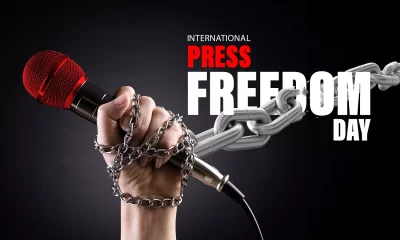
 Comments and Issues1 week ago
Comments and Issues1 week agoThe silent press and the silent siege

 Comments and Issues7 days ago
Comments and Issues7 days agoThe politics and optics of electronic transmission of election results
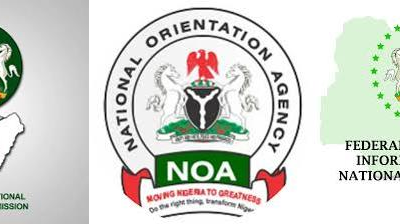
 Comments and Issues7 days ago
Comments and Issues7 days agoCombating Political Apathy in Nigeria, Reigniting the Nation’s Democratic Spirit
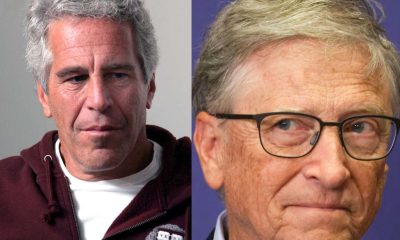
 Health6 days ago
Health6 days agoDOJ files expose Gates–Epstein ties in pre-COVID pandemic planning, funding

 Football1 week ago
Football1 week agoSarr’s strike ends Crystal Palace’s 12-match winless streak with victory over Brighton
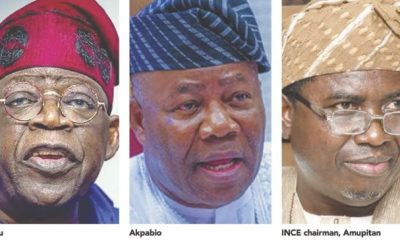
 Comments and Issues7 days ago
Comments and Issues7 days agoSenate’s coup against Nigeria’s democracy

